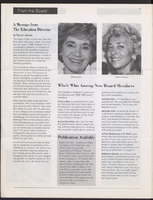Search the Special Collections and Archives Portal
Search Results

Zoe Albright oral history interview: transcript
Date
Archival Collection
Description
Oral history interview with Zoe Albright conducted by Barbara Tabach on October 16, 2018 for the Remembering 1 October Oral History Project. In this interview, Albright describes her work as a volunteer for the Red Cross and helping comfort those who came into the Metro Police Station after the 1 October shooting, searching for family and friends who were present at the Route 91 Harvest Festival. In addition to being a Red Cross volunteer, Albright is also a personal trainer, nutrition consultant and resident of Las Vegas since 1988.
Text
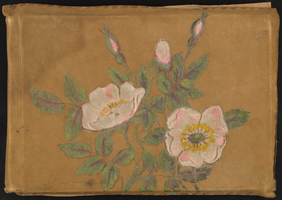
Scrapbook of poetry and other clippings
Date
Archival Collection
Description
Scrapbook of poetry and other clippings
Mixed Content

Morgan H. Mills interview, March 26, 1981: transcript
Date
Archival Collection
Description
On March 26, 1981, Matthew A. Carr interviewed Morgan Mills (b. July 27, 1914 in Grand Junction, Colorado) about his life in Boulder City, Nevada and his work at the Boulder (Hoover) Dam site. Mills speaks primarily about his time working on the dam as a mechanic with the United States Bureau of Reclamation, as a tourist guide with the Boulder City Tourist Bureau and as a musician in local bands. Moreover, Mills speaks about attending the University of Nevada, Reno and playing music there. Lastly, he talks about the Great Depression, how it affected Las Vegas and Boulder City, the development of different infrastructure and the speakeasies in Boulder City during the Prohibition era.
Text

Transcript of interview with Cecile Dotson Crowe by Darin Toldisky, April 27, 1981
Date
Archival Collection
Description
On April 27, 1981, Darin Toldisky interviewed Cecile Dotson Crowe (born October 17th, 1911, in Millville, Utah) at Clark County Library in Las Vegas, Nevada. This interview covers Mrs. Crowe’s account of the building of Hoover (Boulder Dam). Mrs. Crowe discusses the Six Companies, Boulder City, and recalls President Franklin Delano Roosevelt’s visit to Nevada by train to dedicate the dam on the 30th of September, 1937.
Text
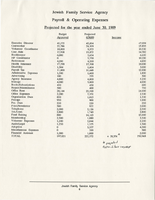
Orientation manual of the Jewish Family Service Agency of Clark County, 1989
Date
Archival Collection
Description
The orientation manual of the Jewish Family Service Agency provides guidance for the duties of the board of directors, the operation of the agency, the organization chart, and staff listing. It also outlines the role of volunteers in the agency.
Text
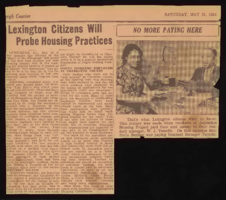
Housing Authority of Williamson, West Virginia: scrapbook, work notes, correspondence, and newspaper clippings
Date
Archival Collection
Description
Folder of materials from the Mabel Hoggard Papers (MS-00565) -- Civic engagement file. Includes a scrapbook, work notes, correspondence, and newspaper clippings related to Mabel Hoggard's employment at the Housing Authority of Williamson, West Virginia.
Mixed Content
Marilyn Kirkpatrick (Clark County Commisioner) oral history interview conducted by Magdalena Martinez: transcript
Date
Archival Collection
Description
From the Lincy Institute "Perspectives from the COVID-19 Pandemic" Oral History Project (MS-01178) -- Elected official interviews file.
Text

Transcript of interview with Michael Tell by Barbara Tabach, January 6, 2018
Date
Archival Collection
Description
Michael Tell, the youngest son of Jack and Beatrice Tell, is the publisher of the Las Vegas Israelite newspaper and the second generation of ownership. He briefly traces his Jewish ancestral roots back to Eastern European grandparents who settled in New Jersey and New York. He became a bar mitzvah in a conservative Jewish synagogue in New York City. At age sixteen, he accompanied his father, Jack Tell, westward to Nevada. The elder Tell was in pursuit of owning a newspaper and Mike was a perfect companion as Jack took over ownership of the Territorial Enterprise. Mike recalls it was a short lived venture and the family settled in Las Vegas, where his father went to work for Hank Greenspun at the Las Vegas Sun and then for Henderson Home News, owned by Morry Zenoff. In 1965, Jack Tell opened the Las Vegas Israelite. Meanwhile, Mike explored the lucrative business of concert promotions and opened a teen nightclub 1961 called the Twin Lakes Twist. He hired such talents of the era as Bobby Darin and Wayne Newton. Soon his business acumen grew and he moved Mike Tell Productions to Los Angeles. He tells the story of his last concert, booking Al Green, and being held at gunpoint. Then in 1979, he returned to work at the Israelite, which had a circulation of about 2000. The Jewish community was beginning to show signs of growth. He recalls running an ad in 1992 for High Holy Days services to be held at the Aladdin hotel. He used the word “Lubavitvh” in the ad and this sparked an interest in Las Vegas from the Chabad movement. He also recalls anti-Semitic episodes in Las Vegas, such as Ralph Englestad’s Hitler birthday parties and the presence of Skinheads. And he reflects on the changes in the community that he has observed over the decades.
Text
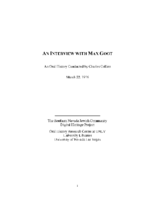
Transcript of interview with Max Goot by Charles Collins, March 22, 1976
Date
Archival Collection
Description
Interview with Max Goot by Charles Collins, March 22, 1976. In this interview, Goot talks about how he came to Las Vegas in 1945 and purchased Stoney's Jewelry, which he sold in 1951, and then bought Tinch Furniture Store. He was friends with Hank Greenspun and active in local politics and community affairs, including Temple Beth Sholom. He talks about selling the former Beth Sholom building at 13th and Carson Streets to the Greek church, and other fund raising activities. He speaks briefly about atomic tests, and the growth of the city.
Text

